Peter MALONE
Saturday, 18 September 2021 19:45
Broken Sabre

BROKEN SABRE
US, 1966, 89 minutes, Colour.
Chuck Connors, John Carradine, Peter Breck, Wendell Corey.
Directed by Bernard Mc Eveety.
Broken Sabre is a small-budget, conventional but entertaining western. it is a star vehicle for Chuck Connors. It also features some veteran stars including Wendell Corey, Macdonald Carey and Cesar Romero. It is about the officer, loyal to his superior, who takes the blame in a court martial, is disgraced and then is used by the President of the United States, Ulysses Grant, to infiltrate a Mexican robbery ring. There are life and death situations until the hero is finally vindicated. Direction is by Bernard Mc Eveety, who worked for a number of Disney films in the '70s.
1. Interesting and entertaining western? Army? Politics? Indians? Mexicans?
2. Location photography, the West, Washington society, politics? Musical score?
3. The title and the reference to Mc Cord? The opening credits? The court martial and his disgrace? His reputation, secret mission, endangering his life, vindication?
4. Jason Mc Cord as a western hero? The impact of his disgrace? In the western town? The daughter of the Senator coming to bring him to Washington? His return, suspicions of society, the men bashing him? The Senator and his welcome ? but wanting him to side against the Indian treaty? His grandfather, brandy-drinking, support of his grandson? The President and the secret mission? Travelling to the West, infiltrating the Mexican group, the interview with the Chief? The proposal of the plan, training, its execution? The letter of the law Major and his imprisoning Mc Cord, the firing squad, the Mexicans turning against him, his one last request, his vindication? The return to Washington? Western hero?
5. The daughter of the Senator, her coming to the West, love for Mc Cord, supporting him, happy reunion? Western heroine?
6. The Senator and his plan, armchair politics? The Indian treaties and their importance? Changing them? Snow and his singling out McCord? for the mission? The discussion with the President? The President's faith in Mc Cord?
7. His grandfather, the family honour, the transcript of the court martial, the welcome, the brandy-drinking?
8. The Major and his interpretation of the law, the death of his son at Bitter Creek, his animosity towards Mc Cord? His listening to his wife? McCord's attempt at escape? The firing squad, the final request, his being vindicated? His bitterness purged with the memory of his son's death?
9. The officers and soldiers and their hostility towards McCord? The leader of the firing squad detail and his support?
10. The Mexicans, rabble- rousing, the Chief, the raids? The plan and its execution? The two prisoners, the bitterness against Mc Cord, vindicating his innocence?
11. Themes of the military, the Indian territories, politics?
Published in Movie Reviews
Published in
Movie Reviews
Tagged under
Saturday, 18 September 2021 19:45
Broken Vows
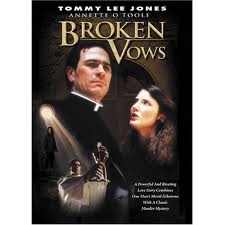
BROKEN VOWS
US, 1987, 94 minutes, Colour.
Tommy Lee Jones, Annette O'Toole, M.Emmet Walsh, Milo O'Shea, Frances Fisher.
Directed by Jud Taylor.
Broken Vows is the story of a contemporary priest in crisis, who does not realise he is in crisis until he begins investigating a murder. Tommy Lee Jones is quite effective in the central role.
The film focuses on a murder, offers a mystery, without a sensational solution. The focus is on the priest, the effect of the dead man on him, his relationship with the dead man's girlfriend and his own crisis of celibacy and priesthood.
The film has a strong cast including Annette O'Toole as the girl, Frances Fisher as the wife, Milo O'Shea as the Monsignor, Emmett Walsh as the detective.
1. The story of a priest and his crisis, the blending with the murder mystery?
2. The American city, the inner city parish, the apartments, the art world? Musical score?
3. Titles, expectations? Dramatising a crisis?
4. Tommy Lee Jones as Joe Mc Mahon: credible, seeing him alone, watching It's A Wonderful Life on television (and its comment on his life)? Getting up late, rushing to work, hearing the boys' confessions, his easy answer that sins are an offence against God, hurrying them up? (This used later by Dan Phelan to attack Father Mc Mahon for not helping him?) The boy taking him to the death, the impact of Stuart in his dying, serenity, private religion, readiness to die? The change in Joe Mc Mahon? The discovery of who Stuart was, his mother's coming, the celebration of the Requiem Mass?
5. The police and their investigations, Hannigan and his leering crudity, finding Joe at the scene of the crime, his sly comments, insinuations about sexuality, phoning Joe at Nim's apartment, being right about Joe's future?
6. Maureen and her anger, her marriage to Dan and advice from Father Mc Mahon, Dan as gay and going to the bars, his being arrested, attempting suicide, his desperation in talking with Father Mc Mahon and the lack of help when he was young? Maureen telling the truth about herself and Roderick? Dan's wandering from the hospital, being taken back?
7. Monsignor as the pious parish priest, nice and helpful, yet no help? Insinuations and questions, going into Joe's room, trying to support him, but merely talking platitudes? The focus on God, people coming to the church rather than the priests going out? His representing the church in the dramatising of this crisis? The glimpse of the curate and his own life, not being disturbed?
8. Nim and her arrival in the sacristy, the run and Father Mc Mahon chasing her, his meeting her next day, her taunting and flirting, her art, the name of Emile Bernard? Finding the gallery, the visit with Father Mc Mahon, the questions of the director and his wife? Her relationship with the police? Dinner with the gallery director? Her being in love with Joe, the temptation, sharing with him? Their sexual encounter? Her reaction? Going to Gina and finding the truth? Leaving him with his choice?
9. Drum and Gina, the gallery, the names of the artists, their lies, the dinner, stealing the portrait, the drawing and discovering Drum in the drawing, the confrontation, the truth, Gina's callous motives in Stuart's death?
10. The effect on Father Mc Mahon: his going out with Nim, the suit and tie, Monsignor and the comments on worldliness, the dinner with the gallery owner, going back with Nim, going back to her place, his decision about the sexual relationship, the lateness of his return, his not saying Mass, discussion with Monsignor?
11. His comment to Nim about the betrayal of his vows, his belonging to the church, his discussions about the church, arguments, discussions about celibacy and celibacy as a sacrifice? The nature of priesthood? His comments to Monsignor about the nature of an effective priest? (How would this have been handled in reality; realism versus dramatising a crisis?)
12. Personal, study, thriller framework? The church in the '80s? The crises in priesthood? Questions of relationships, sexuality and celibacy?
Published in Movie Reviews
Published in
Movie Reviews
Tagged under
Saturday, 18 September 2021 19:45
Bronco Billy
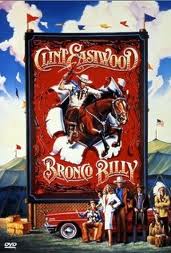
BRONCO BILLY
US, 1980, 111 minutes, Colour.
Clint Eastwood, Sondra Locke, Geoffrey Lewis, Scatman Crothers, Sam Bottoms.
Directed by Clint Eastwood.
Clint Eastwood has made many boisterous westerns and comedies. However, when he directs films, he takes himself and themes more seriously. Here he successfully combined the knockabout with the western, the American themes with humour and made a most amiable picture of the American Dream: be what you want.
The credits song is about cowboys and clowns, the finale sentimental hero worship. The tatty Wild West show, the echoes of '30s screwball comedy with a runaway heiress (Sondra Locke again), a gallery of socially down-and-out 'characters' played by a group who appear often with Eastwood, an emphasis on nice behaviour, make this an easily pleasing, U.S. morale boosting entertainment.
1. The popularity of Clint Eastwood? His film persona, his interests, style, presence? His tough tradition e.g. the westerns? His possibility of sending himself up? His serious exploration of themes? His emergence through the '70s? Bronco Billy as opening the '80s?
2. Audience enjoyment of and knowledge of the western traditions? Heroes, the frontier, cowboys and Indians, cowboy skills? Confrontation of Indian and white man? Toughness, horses etc.? The serious heritage of the American dream? Its possibility of being satirised? How well did Bronco Billy take the myth seriously and yet spoof them? A sentimental presentation of the American Dream - cowboys in the late 20th. century?
3. The film's statements about the American Dream - people being what they want to be? Embodying the past traditions in the context of the present? The morale boosting of the American Dream as necessary around 1980?
4. The portrait of the United States - the credits sequences and the lyrical presentation of landscapes and towns? The range of American towns shown, the various states and their landscapes, on the road in America? The various institutions? An atmosphere of realism - with the sentimental touch?
5. Bronco Billy's show, the various items that were presented, the small audiences and the large audiences, the people paying, the institutions e.g. orphanages, mental institutions? The circus atmosphere and the tent, the razzamatazz and the announcing? (And the music played on a record?) The showbiz atmosphere of the show? Costs, hazards of fire? The importance of the touring show and its effect on the audiences? The help to get the show on the road ? with the American flag? Morale boosting?
6. Eastwood's style as Billy? His impact on people - the show itself, the showing of the recruiting of the girls and the knife-throwing act, with blood drawn? His attitude towards the rest of the team? His words to the audience - "little pards" and talk about prayers and study? The interviews with him? The bonds with the rest of the team - seeing them on the road, driving, arguments, working together? His concern for the rest of the team? The encounter with Antoinette, the initial seeing of her in her tatty dress, thinking her an ordinary girl, taking her along, arguments, her arrogance. his putting her out on the road? His changing his opinion of her throughout the film? His reaction to her hardness? Saving her from the assault? The dance, the outing, her drinking? Her seeming to bring bad luck? Training her for the act? Her performance and fear? The mellowing and the story of her life? her concealing the truth? The visit to the asylum? The bond between the two, the love? His reaction to the knowledge of the truth? His needing her and her return? The humorous interlude where Bronco Billy stopped the bank robbers? His encounter with the kids and giving them free tickets for the show?
7. Bronco Billy and the story of his life - telling Antoinette the truth, the shoe salesman, New Jersey, his reaction against city life, his dreams of the cowboy, his shooting his wife? Prison and the friendship with Lenny and Lefty and Doc? His starting the show, fulfilling his dreams? The friendship with Doc and Doc's story? Lefty and his place in the show? The chief and his wife? Taking up Leonard? The importance of Lenny getting drunk, being arrested, the discovery of his being a deserter (and the film's attitude towards the Vietnam war and deserters?) ? the encounter with the Sheriff, the Sheriff showing off? The bribe and getting Lenny back?
8. The build up to the fire? Billy's being away with the Sheriff? The bored audience? The generosity of the carnival people? The decision to ask the asylum inmates to make the tent? The build up to reopening?
9. Antoinette and the traditions of the spoilt American heiress running away? '30s comedy? The wedding and her attitude towards John, the licence, the wedding ceremony itself, her not allowing him to touch her? Her coldness and his reaction? John's stealing everything and disappearing? Her having the tatty dress, borrowing the dime? Bargaining with people especially Billy? Her participation in the show, her arrogance, bad luck? The dance and the assault? Her building up friendships with the group? The visit to the orphanage and her reaction? Her love for Billy and his reaction to her, changing her especially in the sequence in the asylum? The discovery of the truth, her reaction to John? Her return to New York and her former manner? Her taking the sleeping pills, having them only in her mouth? The phone call and her quick return?
10. The picture of the shady lawyer and his deals and outwitting John? Antoinette's stepmother and her gold-digging? Antoinette's reaction to her on her return? John and his deals and finishing up in the asylum, his climbing the building to see Antoinette? The truth?
11. The American tradition of the screwball comedy with the John and Antoinette sequences?
12. Bronco Billy and morale boosting, children, the ordinary townspeople, orphans and his telling his stories, Dr. Canterbury and his learning how to draw, the people in the institution making the tent?
13. The changes to each of the characters throughout the film? Their masks, their reality? The bond of the group and the show going on? The happy ending? The particularly American themes - the American heritage, dream, the show? The American dream and its fulfilment?
Published in Movie Reviews
Published in
Movie Reviews
Tagged under
Saturday, 18 September 2021 19:45
Bronx Warriors 2/ Fuga Del Bronx

BRONX WARRIORS 2 (FUGA DEL BRONX)
Italy, 1984, 89 minutes, Colour.
Mark Gregory, Henry Silva, Valerie Dobson.
Directed by Enzo G. Castellari.
Bronx Warriors 2 is an unexpected follow-up to Enzo Castellari's spaghetti-Mad Max, The Bronx Warriors 1990.
The film shows that in the early '80s the Italians had transferred their spaghetti style from westerns and science fiction to futuristic action, with violence and special effects and stunts. This film has the same central character, Trash, as the original played, laconically, by Mark Gregory. He and the hero from Castellari’s The New Barbarians join forces in New York to confront a wheeler dealing multinational corporation executive who is destroying the Bronx to rebuild New York. The inhabitants are being exterminated (including Trash's parents being fire torched). The film, as with the original, utilises the waste landscapes of the Bronx and its underground with a confrontation between the gangs and the business-suited executives and their death squads. The film has the presence of Henry Silva as, once again, the conscienceless smiling exterminator. There are the usual brutal effects and action. On its own level it works well enough as 'R' rated matinee entertainment attempting unsubtle social comment. It does raise questions about the tastes and values of an audience (European and American) which encourages this kind of sequel. Once again there is the acknowledge ment in the copying of aspects of the Mad Max films.
Published in Movie Reviews
Published in
Movie Reviews
Tagged under
Saturday, 18 September 2021 19:45
Brood, The
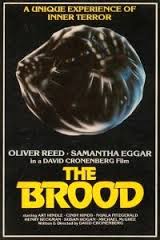
THE BROOD
Canada, 1979, 88 minutes, Colour.
Oliver Reed, Samantha Eggar, Art Hindle.
Directed by David Cronenberg.
The Brood is written and directed by Canadian David Cronenberg whose repulsively fascinating horror films, Shivers and Rabid, showed contemporary society infected by parasites. This is a much more respectable film, restrained (at times almost too much so after his previous crude horror exuberance) and much more intellectual and stylish. With nods to such films as Forbidden Planet and Don't Look Now, the screenplay links monsters with the psyche, the Shape of Rage, in mutant children embodying the angers of the human soul. Uncontrolled therapy breeds destruction. Psychodrama becomes psychoplasmatics. Oliver Reed and Samantha Eggar star in what could become a reputable horror classic.
1. The appeal of horror films? Science fiction? The blend? The horror techniques and conventions here and their blend with science fiction? The background of nightmare, the psyche, shadow aspects of human life? How enjoyable this kind of fiction? The purging of fears?
2. A Canadian production, the English stars, locations, colour photography, score?
3. The background of monster films and terror? The menace and combat and monsters ? and the conventions of the genre: appearance, fear, clash, violence? Mystery and ugliness? Detection, the chase? The atmosphere of catastrophe?
4. The use of psychodrama and the plausibility of the plot? As a basis for horror? The importance of the opening role-play and the way that it was photographed in tableau? Dr. Raglan and his role, communication with his patients? The patient and his enacting of talking with his father? Nola and her various psychodramas? The consistent way in which they were filmed, their being interspersed throughout the film? Their importance for revelation of character, indication of theme, plausibility? The invention of psychoplasmatics? A key for the science fiction imagination? The film's comment on therapy and its use, help, its menace if taken too far and uncontrolled? Helping and intervening, the dependence of the patient on the director? Isolation therapy and its effect? The shape of rage and the embodiment of rage in creatures? The takeover by psychic powers of the free will and control of the person?
5. The film's theme of the Shape of Rage - the book, its prominence? The people reading it e.g. the teacher? As a title for the embodiment of angers? Nola and the embodying of her angers and rage - her role-plays about her parents, her husband, the teacher, Candy? So much giving birth to rage that they contorted her body, its male/female grotesqueness and its revelation at the end? The symbolism of giving birth to the shape of rage, an attic full of rage characters, their capacity for murder, their mutant nature. the impression that they had not been born? Their having to be killed and their destroying of Nola? The shape of rage out of control?
6. The brood and the title of the film? The overtones of brooding, a group of animals, menacing animals, menacing animals, monsters? Psychological and cruel mutants?
7. The quality of the screenplay - the presentation of the institute and its way of therapy, the presentation of Raglan and his work, his assistants and their impersonal presentation of themselves, the patients - their participation in role plays, their later being sent away, the bearded patient and his initial role-play, his being betrayed and reporting to the family? The patients being destroyed?
8. The focus on Nola? Background, the unhappy marriage, her being away from her husband and home, the isolation? Her reaction to her mother and her affairs, her father and his leaving home, the teacher and the jealousy? The role-plays, the re-enactment of her rage, telephone calls? The final contortion and horror? The husband trying to persuade her to control her rage and the mutants? Her revelation of herself to him? Her wanting to possess her daughter? Her death and the destruction of the monsters?
9. Her husband and his admiring of Raglan, his attitude towards Nola and her therapy? His coping with the situation at how, his love for his daughter and the family sequences with them? His mother-in-law and his attitude towards her, her death? The visit of his father-in-law, discussions, death? The liaison with the police? The friendship with the teacher, the visit to the school, her death? His helping Candy through her trauma and her not wanting to admit that she had seen the killings? The build-up of suspense, the kidnapping of Candy? His attempts to rescue her, collaboration with Raglan, holding Nola? How well developed his character, the hero of the film, audience identification?
10. The domestic scenes in contrast with the horror - the mother-in-law and Candy, the funeral, the contrast with the ugliness of Candy's capture and the small lyrical scene of her walking down the street with the mutants in their raincoats?
11. The role of the teacher, her help, Nola's phone call, the control of the class, the ugliness of her death?
12. Candy as the focus of attention, a little girl, her separation from her mother, her love for her father? Her seeing the killing of her grandmother? Hiding, blocking out the horror? Her being shaped by Nola? The capture, walking with the brood, prisoner in the attic, the final rescue?
13. The ordinary tone of the opening of the film, the low-key presentation of horror initially, the death and the suggestion of mystery, ugly noises and looks? The growing number of the brood? Raglan's final decision to give himself to save Candy, his trying to hold the mutants, their murdering him? The grotesqueness of Nola and her death? The final irony and Candy's infection?
14. A satisfying use of horror conventions for exploring the psyche and evil, power, contortion and destruction? An image of contemporary society?
Published in Movie Reviews
Published in
Movie Reviews
Tagged under
Saturday, 18 September 2021 19:45
Brotherhood of Satan, The
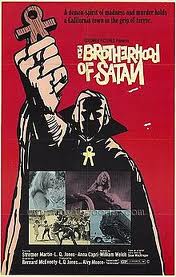
THE BROTHERHOOD OF SATAN
US, 1970, 93 minutes, Colour.
Strother Martin, L Q. Jones, Charles Bateman, Anna Capri, Charles Robinson, Alvy Moore, Geri Reischl.
Directed by Bernard Mc Eveety.
The Brotherhood of Satan is a small-budget horror thriller without well-known stars. However, it is very good of its kind quite genuinely horrifying.
It was produced by L. Q. Jones who plays the part of the sheriff. Jones has worked often with Strother Martin who plays the doctor. Direction is by Bernard Mc Eveety, a name more associated with the Disney Studios than this kind of horror film. (A number of Mc Eveetys also appear in the cast list.)
The film captures the atmosphere of the isolated and small American town, the world of children, the world of the aged. By showing ordinary things and making them seem different from what they are, the film lures the audience into its world, its atmosphere of witchcraft. The film explores the age- old myth of the seeking of immortality in this world and the selfish devices (aided by mad scientists and superstitious leaders) to gain everlasting life here on earth. Very good of its kind.
1. Interesting and entertaining horror film? The effect of horror films? Nightmares and audiences facing their fears?
2. Wide screen photography, the American landscapes, Middle America, the small American town and its atmosphere? The film's special effects? Editing and pace for suspense and horror?
3. The title and the implications of witchcraft, Satanism? The town fraternity?
4. The pre-credits effect: the toys and the children playing, the tank, the real tank, the crushing of the car? Sinister atmosphere?
5. The special effects for frightening audiences, making them suspicious, for the effects of witchcraft e.g. the red drops coming from the sweet, the father swooping to save his children and audiences fearing something sinister? The doll killing the Bible-reading parents and then shedding a tear?
6. The world of the normal, the innocent - surfaces covering abnormality? The film playing with audience attention, suspicions, tears?
7. Ben, Kiti and Nicky and their trip, the arrival, the accident, going into the town, their concern, communications cut? Ben trying to drive away and having to return? Participating in the search? Discussions with the sheriff and Tobey? The priest and the doctor? The skid and the child on the road? Kitty lost? The discovery of a coven, the final search and the sinister ending? Ben and Nicky as characters in themselves? As a way into the situation for the audience?
8. Dr Duncan and his amiable presence, reasonable, nice? His practice? Response to the mystery? Helping the search? The parents? The irony of his hold over the people? The coven? His plan to transform the old people into children? The irony about his statements on the rational and his being involved in superstition and witchcraft?
9. The comparison with the priest, his concern, his religious background, reaction to superstition? His discovery of the truth? His falling into madness?
10. The sheriff and his place in the town, concern about the children, the parents? Tobey and his help? With the priest, with Ben? The search? The final discovery?
11. The range of parents in the town, their relationship with their children, ordinary lifestyle, mystery, the eerie behaviour of the children, their deaths?
12. The members of the coven, their presence in the town, their seeming gentility?
13. The children and their childlike behaviour? Transformed? Under the power of witchcraft? Their assembling? Victims of the coven? The chill of the ending?
14. A piece of effective horror? Shifting points of view? The unexplained and the inexplicable?
Published in Movie Reviews
Published in
Movie Reviews
Tagged under
Saturday, 18 September 2021 19:45
Brother John
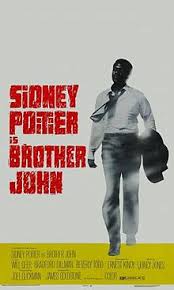
BROTHER JOHN
US, 1970, 95 minutes, Colour.
Sidney Poitier, Will Geer, Bradford Dillman, Beverley Todd.
Directed by James Goldstone.
Brother John, on paper, could have been an entertaining success. Sidney Poitier acts the part of a noble, mysterious man from a Tennessee town who comes in at the time of his sister's death, meets the people, is suspected of being a stirrer from New York, is friendly with a local schoolteacher and then goes on his way, his mission over. But on film, the story is difficult to follow and it never clearly emerges who or what John is or meant to be. Poitier looks suitably solemn and heroic, but that is about all. Will Geer is engaging as an old-time doctor who serves as John's prophet; Bradford Dillman does an excellent Keenan Wynn-style southern mayor. In fact the social side of the film is far more interesting than the 'significant' side.
Charming at times, interesting and entertaining in parts, the whole film is far from satisfying and successful. It raises questions. Not everyone might want to be bothered answering them.
1. Was this film meant to be taken realistically or was it a fantasy? Why?
2. Who was John? Why did the doctor think he was mysterious?
3. Was John meant to be an angel of God come on earth?
4. How effectively did the film present black and white relationships? Housing and schooling, industrial disputes, police bullying, ambitious Southern mayors?
5. Did Sidney Poitier present John as a good man, a saint?
6. Where had John been, where had he gained his experience?
7. Why did John move on, where was he going? Had he changed
his town much?
8. Was the doctor a good prophet or apostle of John?
9. Did you like the film? Why? If you did not like it, what was wrong with it?
Published in Movie Reviews
Published in
Movie Reviews
Tagged under
Saturday, 18 September 2021 19:45
Brother Sun, Sister Moon / 1972
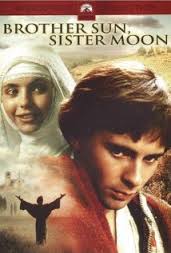
BROTHER SUN, SISTER MOON
UK, 1972, 113 minutes, Colour.
Graham Faulkner, Judi Bowker, Alec Guinness, Lee Montague. Valentina Cortese, Adolfo Celi, Kenneth Cranham. Directed by Franco Zeffirelli.
Brother Sun, Sister Moon is Franco Zeffirelli's third film. His previous films, The Taming of the Shrew and Romeo and Juliet, were noted for their visual beauty. This film at times looks almost too exquisite - fields of flowers, papal pomp - and yet the sequences in the dank atmosphere of the Bernardone dye factory are also horrifyingly moving. Zeffirelli's St. Francis is a strange person. out of tune with the popular attitudes of his time, not quite in touch with the world around him, an idealist, a dreamer, an inspirer. The story of Francis is a criticism of the status quo values of his world, values criticised today. Indeed the film seems a saintly justification for antiwar, anti-parents, anti-wealth, anti-institutional religion, pro-simplicity, pro-authenticity attitudes of youth today.
1. Was this film too beautiful to look at or was its visual beauty an important contribution to the film? How did Zeffirelli's style of focusing on faces, hands etc., contribute to the mood and impact of the film?
2. Was the beginning of the film successful with its picture of the sick Francesco and the intercutting of flashbacks? Initial impressions of Francesco? What did the flashbacks add? a typical young man of Assisi, going to the war, clothes' fittings, friends, Clare and the lepers, chasing girls, relationships with his mother and father, wealth?
3. What effect did the illness have on Francesco? His going on the roof after the bird? His lone wanderings? Reflecting on the war and his life? What were his reactions to his parents and their way of life - the significance (and visual impact) of his going through the factory and encountering the people there, his weeping? Mass attendance with the rich, the poor at the back?
4. How convincing was his conversion, its religious content, his experience of the Cross at Mass, the ruined Church of San Damiano, the influence of Clare? What was your reaction to his throwing his father's goods away, to his speech before the Bishop and the townspeople, to his stripping off everything and going away to freedom? Were his ideas of freedom authentic?
5. What kind of man was his father - How much governed by appearances, how loving, how ambitious (his store of wealth), how self-righteous (taking his son to the Bishop and disowning him)? His relationship to his wife? Her suffering when Francesco left?
6. How did Francesco change in character after his conversion, love for the poor, sick and suffering, rebuilding San Damiano, his poor habit etc?
7. How important for the film was Bernardo's return from the Crusades, his encounter with Francesco, his disillusionment with society and his joining Francesco, other friends joining Francesco? The significance of the friend being fearful and then defying the Emperor Otto?
8. Was the picture of the early Friars an attractive one - their singing and begging, Francesco going to his home, the encounter with Clare and the bread, Silvestro's temptations (and Francesco's advice to him to marry - how reasonable and perceptive was this?); working in the fields and sharing food, the work at San Damiano? What were they doing? Trying to achieve? Did they have peace of mind? The significance of Clare joining them? The dedication of San Damiano?
9. The opposition and hatred in Assisi, the machinations of Paolo, the soldiers' attack on San Damiano. Why did this mystify Francesco? Why did he need to go to Rome?
10. Religion, the Bishop of Assisi and his eating (after Lent), the squabbles with officials about honours in meeting the Emperor? Were the criticisms valid? Overdone? why did Paolo interfere with Francesco's visit to the Pope?
11. What was the visual impression of the Papal court - the censers. enthroned and bejewelled bishops, the remote Pope (and the different photography angles of Christ in the apse mosaic)? What comment did the contrast of Francesco and the friars with the Papal court ? dress, Gospel message, religion? offer?
12. What kind of man was Innocent III? What happened to him after Francesco's visit? Why did he call him back? Speak to him as he did? Kiss his foot? How ironic was his retreating back to and being locked into his vestments? What effect did this Papal guarantee give to Francesco?
13. The film attacked formalistic religion but made Francesco a hero. What kind of religious hero was he? Was his behaviour explicable only by his faith in Christ? How Christlike was Francesco, how did the film keep highlighting this? Did this Christlike picture of Francesco have much to offer to modern audiences?
14. The characters, incidents and style clearly paralleled modern situations - disillusionment with war, society and its values, parents, officials of church and state, dropping out, prophetic action, natural and musical worship of God (contrasting with the rich in their isolation in the Cathedral), commune living etc. Was this objectively presented or overloaded against the establishment? Why?
15. What did Donovan's songs and music contribute?
16. Why should Francis of Assisi be popular and worth making a film on today, over 700 years after his death?
Published in Movie Reviews
Published in
Movie Reviews
Tagged under
Saturday, 18 September 2021 19:45
Browning Version, The
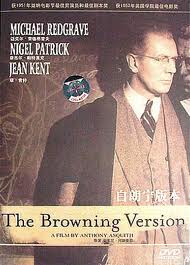
THE BROWNING VERSION
UK, 1951, 90 minutes, Black and white.
Michael Redgrave, Jean Kent, Nigel Patrick, Wilfred Hyde White, Bill Travers, Ronald Howard.
Directed by Anthony Asquith.
The Browning Version was adapted from his own play by Terence Rattigan. It was directed by Anthony Asquith who collaborated with Rattigan on a number of films including The V.I.Ps.
The film focuses on a disenchanted schoolmaster and his having to cope with his unpopularity, the infidelity of his wife, his inability to communicate with his colleagues. Michael Redgrave gives a superb performance as the broken Andrew Crocker Harris who ultimately is able to transcend himself. The occasion is a tribute from a student, the translation by Robert Browning of the Agamemnon. His speech at the end is a moving summing-up of the experience of the sad master. Jean Kent is brittle as his unfaithful wife, Nigel Patrick sympathetic as the teacher. There is interesting support from Wilfrid Hyde White as the headmaster and Bill Travers as the sportsmaster.
The film is in the tradition of Goodbye Mr. Chips - but in reverse in terms of popularity and the warmth between husband and wife. An excellent British film of the '50s.
1. Interesting drama? Insight into human nature?
2. Terence Rattigan's play, adaptation for the screen? The strength of the drama, the quality of the dialogue and interactions? The opening out of the play? The strength of the cast?
3. Black and white photography, the atmosphere of the school, the confined playing to school and home? Authentic?
4. The tradition of Goodbye Mr. Chips? The film as an anti-Mr. Chips? The film's comment on British education? Teachers and the effect of their devotion to students? A tribute to English education?
5. The quality of Michael Redgrave's performance as Crocker Harris? Appearance, manner, age, health? The experience of his career? Sense of failure? Narrow outlook? The passing of the years, the conduct of his classes, brittle and formal? Lack of relationship with the boys? Enduring his classes? Nicknames: the Crock, the Himmler of the Lower Fifth? The effect on him as a person, his health? A pathetic figure? The headmaster and his attitudes, despising him? Treating him brutally? The lack of relationship with the staff? Ridicule and mockery? No expectations of him? A sad ending to his career?
6. Crocker- Harris and his relationship with Millie? His motive in marrying her, the brittleness of their marriage and the passing of the years, his love for her? Permitting her her affairs? Her taunting him with them? Her controlling him and his having to cope? Allowing her her way? Millie and her presence, manner, the disappointments of her life, ambition, cold, resentment and anger, her jeering at her husband? Her keeping face? The headmaster and her charm? Frank and the affair, her possessiveness over him?
7. Frank as a genial teacher, friendship with Crocker- Harris, popular with the boys, smooth manner, the infatuation with Millie, the affair with her? His feelings as regards Crocker Harris and the truth?
8. Taplow and the boys, the mockery of Crocker- Harris, the behaviour in class? Lack of interest in the classics? Taplow and his bringing of the gift? Crocker Harris's reaction, emotional? His being touched? Millie's bitter suggestion about Taplow's motives? The effect on Crocker-Harris?
9. The sequence with the new teacher, the teacher not aware of Crocker- Harris's sensibilities, the discussion about the Himmler of the Lower Fifth? His apology for having hurt him?
10. Millie's bitterness and Crocker- Harris's ability to make a final decision, the support of Frank who could see through Millie? His freedom? Allowing Millie to go her way? Some self-respect?
11. Crocker-Harris? and the speech, the timing, the attitude of the headmaster, Fletcher as the sports hero? His making a decision, the beginnings of his speech, ineffective, putting away a text, speaking spontaneously, the outpouring of his experience, the reaction of the staff and the students, of the headmaster?
12. The film's comment on the teaching career, the demands, subjects, the classics and their power, lack of impact on contemporary students? Teachers being defeated by their students, their inability to cope? The pathos of the failed teacher?
13. The film's detailing the life of the school - classes, punishments, sport, teachers as idols? The socialising of the boys with the staff? The common-room, the staff and their jokes, infighting? Snobbery?
14. The quality of the film, a literate film? The British industry of the '50s?
Published in Movie Reviews
Published in
Movie Reviews
Tagged under
Saturday, 18 September 2021 19:45
Brubaker
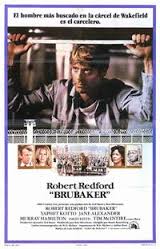
BRUBAKER
US, 1980, 130 minutes, Colour.
Robert Redford, Yaphet Kotto, Jane Alexander. Murray Hamilton. Matt Clark, Tim Mc Intire, Richard Ward, Albert Salmi, Linda Haynes, John Mc Martin.
Directed by Stuart Rosenberg.
Brubaker is earnest, an entertainment that has high and strong moral purpose. While it utilizes well so much conventional prison film material (always interesting, dramatic and depressing), the focus is on the need for reform and the probe elms in achieving it. If all depended solely on the reforming warden, Harry Brubaker (played with quiet authority by Robert Redford), much would have been achieved. However, there are hostile prisoners, local corruption and the obtuseness of officials and politicians who see reform as a threat or only in terms of furthering their own careers. These characters are well delineated and frustrating for Brubaker and the audience. Based on facts, well made and involving, with telling points and, ultimately, not hopeful. Direction is by Stuart Rosenberg who made the significant prison film Cool Hand Luke (1967) with Paul Newman. This film has been considered a companion piece to Brubaker.
1. Audience response to prison films? Expectations of plot, characters, situations, message? How much of the expected material in this film? The quality of its presentation? The emotional impact for audiences?
2. A 1980 version of prison problems in the United States? The technical aspects: colour, Panavision photography, the Ohio prisons especially Wakefield? Exteriors in the fields, the yards? Interiors? The contrast of modern buildings e.g. the Hilton? The editing? The style of music?
3. The film as a Robert Redford vehicle? His screen presence, authority, audience identifying with him? His own personal interest in the project and communicating aspects of prison reform to a wide audience?
4. The atmosphere of realism - the film's being based on facts, the work of Thomas Murton and his attempts at prison reform and his failure? His technical advice on the film? The points made realistically about the details of prison life, administration, abuses and corruption? Violence? Humiliation? The contriving of so many issues within the space of the film's time? The highlighting of issues in realistic as well as contrived tones?
5. Basic prison issues of law and order, crime and guilt, punishment and debt to society? The status of criminals? Their right to livelihood and respect after crime? The role of government in the prison? Prisoners participating in their own lives and administration of prison? The importance of rehabilitation, dignity? Prisons and the treatment of prisoners being an image of the stances and values of free society? The film's comment on American values?
6. The impact of the opening, the usual arrival of criminals at the prison, the great attention to detail in the prisoners arriving, haircuts, clothes etc.? Humiliations, bribes? The physical conditions of the prison? The role of the trusty? The warden? The building, the dormitory, the dining room? Work situation? The old building at Wakefield? The worst aspects of its way of life? Violence, abuse, sexual abuse? The way these were suggested?
7. Robert Redford arriving as Stan Collins, the prisoner, the audience watching Redford go through these initial procedures? The audience observing the abuses with him? Experiencing things with him? His handling of the situations? His interventions? The berserk prisoner in solitary? The taking over of Dickie Coombes? His going to the prison warden and announcing his real identity? The surprise value of this move for the audience?
8. The impact Robert Redford made as Brubaker? The explanations of his background, prison reform, teaching? His handling of the men in detail? His relationship with Lilian and her backing of him? Lilian and her backing by Deach, head of the prison board? The trusties and their suspicions? The sequences of Redford in his private apartment, the human touches? The atmosphere of hostility? The disasters - especially the roof falling in? The confrontation with the carpenter and his dealings? The meals and Brubaker joining the men? The games and people laughing, the visitors enjoying the polo? Brubaker's participation? His earnestness, his confrontation, especially with the builder and his sitting behind the desk, the doctor and his selling the prisoners' blood, the demand for the ambulance after the roof coming in?
9. The portrait of the board and the variety of attitudes? The personalities, their preoccupation with money, attitudes towards criminals, towards crime, towards prison reform? A self-centred view of society? Budgeting, careers? The hostility towards Brubaker? Lillian’s attempts at mediation? The senator and his initial silence? The later meeting and his threats, his wanting to use Brubaker's reforms for his own career? The use of self-governing prisons as part of the American way of life? The threat to give Brubaker the sack? The various personalities and the realistic characteristics?
10. The group of trusties and their role in the prison, their exploitation of the prisoners? Calwell and his severity? The beatings? Birdwell and his sharing the room with Huey? The privileges of the trusties, their recreation centre? Huey and his girlfriend and the separate house? The visits to her father's shop and the meat deals? The storage of food, the reselling to supermarkets? The role of Purcell and his subservience, his explaining himself to Brubaker, Brubaker's keeping him on? His wheedling attitude? His connivance in Abraham's death?
11. Coombes and his place in the prison, his observations of Brubaker, the visit to Brubaker's apartment? His own story? Bouncing off Brubaker - sceptical about his reforms? His collaboration? His presence on the council? His attitude at the end and change of heart, the applause for Brubaker?
12. Larry Lee Bullen and his place in the prison, his tough attitudes, Brubaker's helping him after punishment, his proposition about the cars, his response? His life story and the lack of chances? His role in the prison, presence on the council, telling Purcell to get away from the council? His helping in the final chase of Huey? The pathos of his death?
13. Abraham and his work, his life story, work around the prison, his staying after his freedom to go? His telling the story to Brubaker? The story of the buried men? The ugliness of his death and the electric shock, his hanging from the post? The consequences for Coombes? For Brubaker and the squad's digging up the corpses? Despite the opposition of the board? The corpses and the discovery, the doctor and his analyses, the board's doctor denying the testimony? The legal implications? The risk Brubaker was taking in digging up the corpses?
14. The council, the election, the conditions? The campaigning and its humour? The election day and ballot? The meeting and the hesitation, Brubaker's allowing the group to work?
15. The encounter with the prison board at the Hilton, Lillian and Brubaker's attacking her for her stances? The meeting with the senator in the morning? The clash with Lillian and breaking with her?
16. The confrontation with Huey, his having killed Abraham, in the house with the girlfriend? The ugliness of the shooting and his death? The reaction of the girl, her father?
17. The build-up to Brubaker's being sacked? The new warden and his previous attitudes? Tough line? The long leave-taking by Brubaker? Coombes and the applause. the prisoners joining in?
18. The sense of frustration for the audience in the lack of possibility for reform? The frustration for Brubaker? What was the audience left with in terms of hope. hopelessness?
19. The perennial interest of prison films? How did this film differ from the average prison film? The blend of entertainment and message?
Published in Movie Reviews
Published in
Movie Reviews
Tagged under